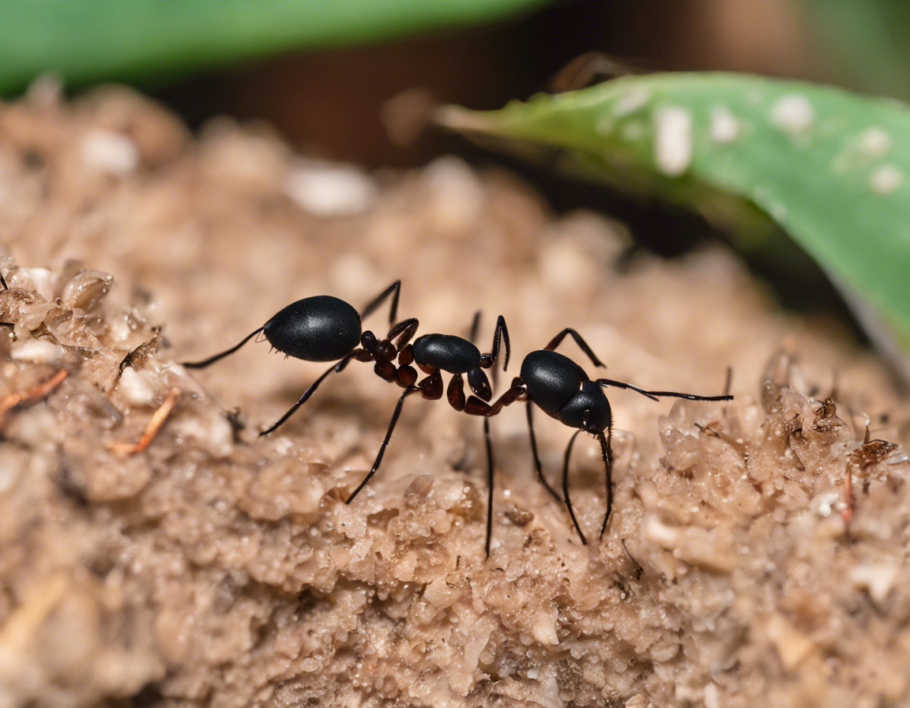Ants are some of the most fascinating creatures in the insect world, with their complex social structures and behaviors. Among the thousands of ant species that exist, one particularly intriguing type is the Fyre ant. Fyre ants, also known as Solenopsis xyloni, are native to the southwestern United States and parts of Mexico. These fiery red ants are known for their unique characteristics and behaviors that set them apart from other ant species. In this article, we will explore some of the most fascinating facts about Fyre ants.
Physical Characteristics
Fyre ants are small in size, typically measuring between 1.5 to 3.0 mm in length. They have a distinct reddish-brown coloration that gives them their fiery appearance. One of the most noticeable physical features of Fyre ants is their two-segmented petiole, the narrow waist-like structure that connects the abdomen to the thorax. This characteristic helps distinguish Fyre ants from other ant species.
Social Structure
Like all ant species, Fyre ants are social insects that live in colonies with a queen, workers, and reproductives. The queen is responsible for reproducing and can live for several years, while the workers are tasked with foraging for food, caring for the young, and defending the colony. The reproductives, also known as alates, are winged ants that are responsible for mating and starting new colonies.
Defense Mechanisms
Fyre ants are named for their aggressive behavior when their colony is threatened. These ants have a potent sting that can cause a painful burning sensation, hence their fiery reputation. When a Fyre ant stings, it releases venom that contains formic acid, which is what causes the burning sensation in humans. The sting of a Fyre ant can be particularly dangerous for individuals who are allergic to insect stings.
Diet
Fyre ants are omnivores, meaning they eat a variety of foods. Their diet consists of insects, aphid honeydew, and plant matter. Fyre ants are also known to be fungus farmers, cultivating fungi in their nests to feed their larvae. This behavior is particularly fascinating as it showcases the intricate relationship between ants and fungi in their ecosystem.
Nesting Behavior
Fyre ants build their nests underground, typically in sandy or gravelly soil. These nests can extend several feet below the surface and contain intricate chambers for housing the queen, brood, and food storage. Fyre ant colonies can range in size from a few hundred to several thousand individuals, depending on environmental conditions and food availability.
Communication
Ants communicate with each other using a combination of chemical signals and physical cues. Fyre ants release pheromones, which are chemical signals that help them navigate, find food sources, and defend their territory. These pheromones play a crucial role in maintaining the social cohesion of the colony and coordinating group activities such as foraging and nest building.
Interaction with Humans
While Fyre ants play a vital role in their ecosystem by controlling insect populations and aerating the soil, they can also come into conflict with humans. Their painful stings make them a nuisance in residential areas, especially if their nests are disturbed. It is essential to exercise caution around Fyre ant colonies and avoid provoking them to prevent stings.
Conservation
As with many insect species, Fyre ants face threats from habitat loss, pesticide use, and climate change. Conservation efforts aimed at protecting native habitats and minimizing human impact on ecosystems are crucial for ensuring the survival of these fascinating ants. By raising awareness about the importance of Fyre ants in their ecosystems, we can help promote their conservation and ensure their continued existence for future generations to appreciate and study.
FAQs About Fyre Ants
-
Are Fyre ants dangerous to humans?
Fyre ants can deliver painful stings that may cause a burning sensation. While their stings are not typically life-threatening, individuals who are allergic to insect stings should exercise caution around Fyre ant colonies. -
What should I do if I encounter a Fyre ant nest?
If you come across a Fyre ant nest, it is best to avoid disturbing it. Do not provoke the ants or attempt to remove the nest yourself. Instead, contact a pest control professional for safe and effective removal. -
How can I prevent Fyre ants from entering my home?
To prevent Fyre ants from entering your home, make sure to seal any cracks or openings in walls, windows, and doors. Keep food stored in airtight containers and maintain cleanliness to avoid attracting ants indoors. -
Do Fyre ants have any natural predators?
Fyre ants are preyed upon by various insect species, birds, and reptiles. These predators help keep Fyre ant populations in check and maintain a balance in the ecosystem. -
Can Fyre ants damage property?
While Fyre ants are not known for causing structural damage to buildings, they can be a nuisance when they invade homes in search of food. Promptly addressing ant infestations can help prevent potential issues.
In conclusion, Fyre ants are remarkable creatures with unique characteristics and behaviors that make them a fascinating subject of study. By understanding more about these ants and their role in the ecosystem, we can appreciate the intricate connections that exist in the natural world. From their fiery appearance to their complex social structures, Fyre ants continue to intrigue and captivate those who take the time to observe their remarkable lives.

